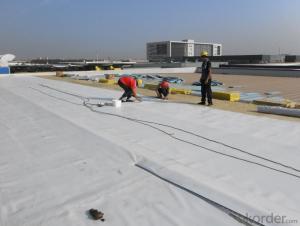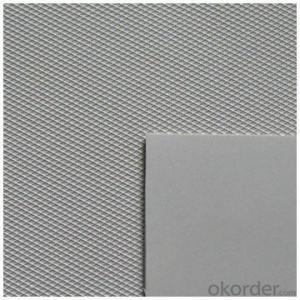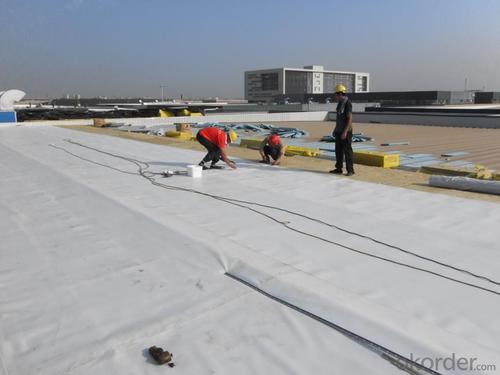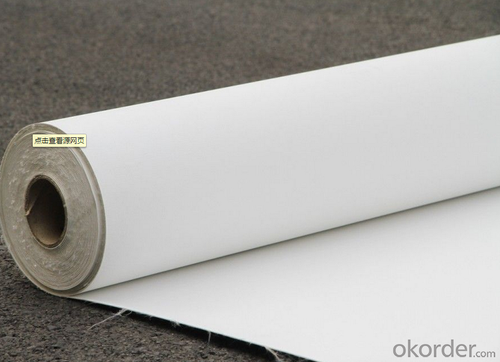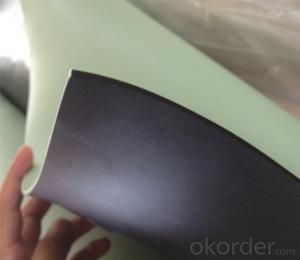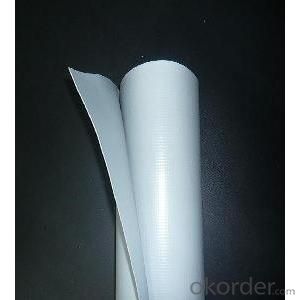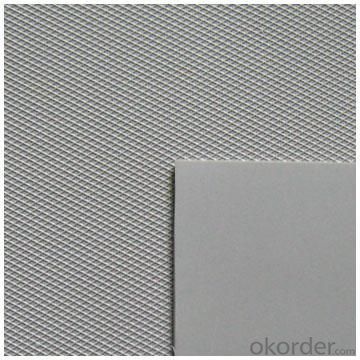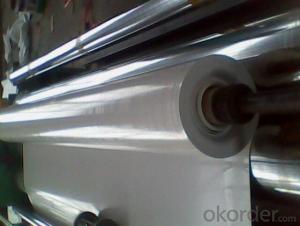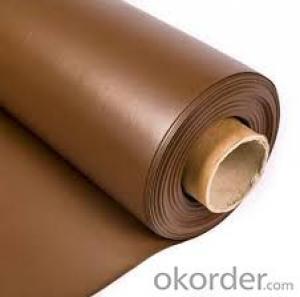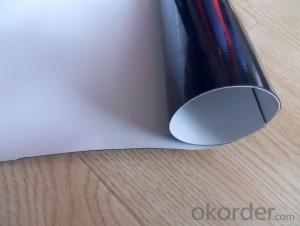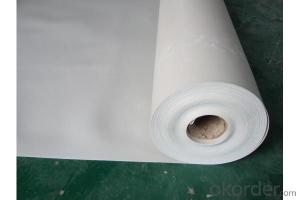PVC Fiberglass Reinforced Waterproof Membrane with 1.2mm Thickness
- Loading Port:
- Shanghai
- Payment Terms:
- TT OR LC
- Min Order Qty:
- 20000 m²
- Supply Capability:
- 5000000 m²/month
OKorder Service Pledge
OKorder Financial Service
You Might Also Like
PVC Fiberglass Reinforced Waterproof Membrane with 1.2mm Thickness
Product Description of PVC Fiberglass Reinforced Waterproof Membrane with 1.2mm Thickness:
PVC Membrane Waterproof /Waterproofing membrane For Roof is a new polymer waterproof membrane. The PVC Membrane Waterproof /Waterproofing membrane For Roof raw material is polyvinyl chloride resin, mixed with plasticizer, filler, antioxygen, ultraviolet absorber and other auxiliaries.
Thickness: 1.2mm/1.5mm/1.8mm/2.0mm
Width:2050mm
Length:20m( Special specifications can be customized)
Size: 2.05mx20m
Color: white/grey, or any other colors.
Features of PVC Fiberglass Reinforced Waterproof Membrane with 1.2mm Thickness:
1. Excellent aging resistance. Service life of roofing material is over 20 years; service life of underground material is over 50 years.
2. Root resistant penetration, specially used on planting roofings.
3. Welding installation. Joints are solid and environment friendly, no pollution.
4. High tensile strength, good elongation and dimensional stability.
5. Good plasticity, easy and suitable for details installation.
6. Fireproof. Fire extinguished out of the ignition resource.
7. Surface is smooth, no fading and dirty resistant.
8. Width is over 2m. Construction wastage is small, more economical.
Classification of PVC Fiberglass Reinforced Waterproof Membrane with 1.2mm Thickness:
1. N: Homogeneous PVC membrane
2. L: PVC membrane with fabric backing
3. W: Reinforced PVC membrane
Advantage of PVC Fiberglass Reinforced Waterproof Membrane with 1.2mm Thickness:
1.) Mixing automation. Apply automatic temperature control automatic time control and automatic feed control.
2.) Extrusion equipment uses twin screw coextrusion. Screw temperature uses computer automatic temperature control system.
3.) Handpiece uses large width didhead extrusion equipment.
4.) Sophisticated three-roller calender equipment. The space between equiment is controlled by automation system.
Technical Data of PVC Fiberglass Reinforced Waterproof Membrane with 1.2mm Thickness:
No. | Item | Model Ⅱ | |
1 | Tensile Strength Mpa ≥ | 12.0 | |
2 | Elongation at break% ≥ | 250 | |
3 | Shrinkage rate % ≤ | 2.0 | |
4 | Flexibility at low temperature | No crackle at -25oC | |
5 | Water tightness | Watertight | |
6 | Puncture resistance | Watertight | |
7 | Heat aging treatment | Appearance | Free from bubble, crack, cohesion and void |
Change rate of tensile strength % | +20oC | ||
Change rate of elongation at break | |||
Flexibility at low temperature | No crack at -20oC | ||
8 | Chemical corrosion resistance | Change rate of tensile strength % | +20 |
Change rate of elongation at break | |||
Flexibility at low temperature | No crack at -20oC | ||
9 | Artificial weathering | Change rate of tensile strength % | +20 |
Change rate of elongation at break | |||
Flexibility at low temperature | No crack at -20oC | ||
Application of PVC Fiberglass Reinforced Waterproof Membrane with 1.2mm Thickness:
PVC waterproof membrane forms an effective barrier to liquid water or water vapor in the steel structure for industrial and civil engineering, underground engineering, such as subway, bridges , tunnel, water pools, shelter, grain depot, land filling and subwayProducts display.
Images of PVC Fiberglass Reinforced Waterproof Membrane with 1.2mm Thickness:
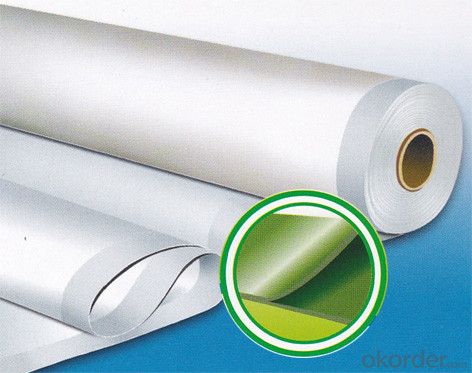
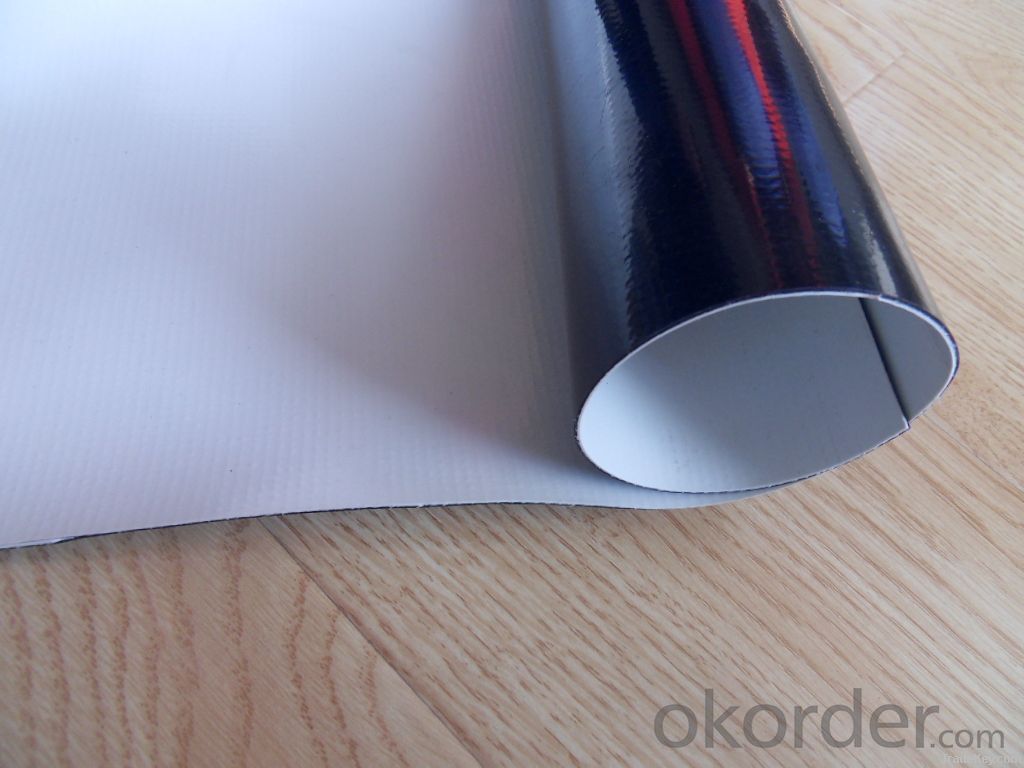
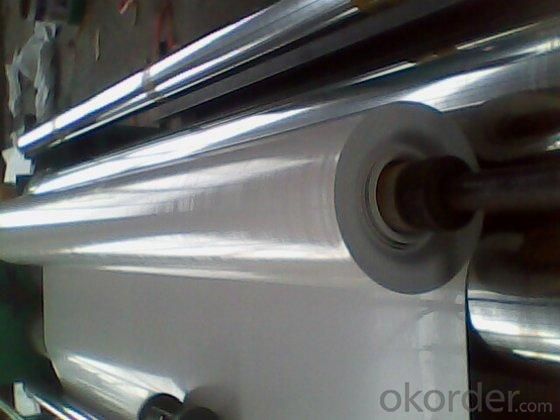
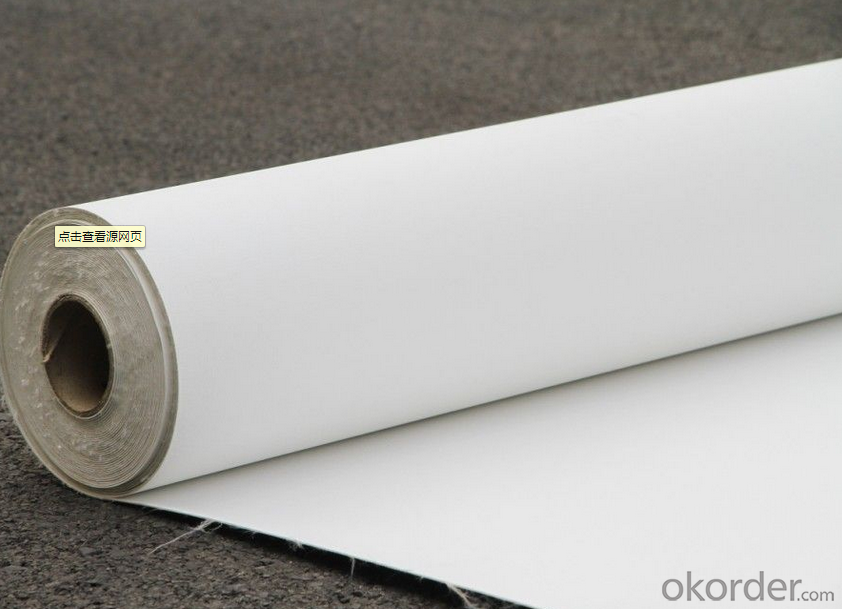
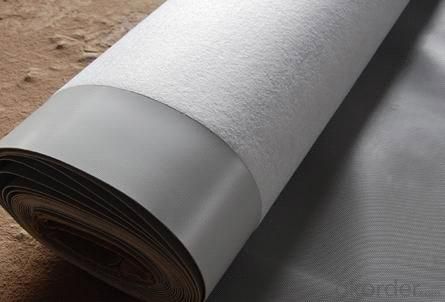
FAQ:
1. Can you produce 4m width?
Yes, no problem for us. We have four bases in China, largest one in this field.
2. How many quantity in one 20'' container for 1.2mm and 1.5mm?
480rolls, 11520m2 for 1.2mm and 400rolls, 9600m2 for 1.5mm
3. Can you provide free samples?
Yes, our samples are free, but express fees usually on buyer's account.
- Q: Can a waterproofing membrane be used on cinder block surfaces?
- Yes, a waterproofing membrane can be used on cinder block surfaces. Cinder blocks are porous materials that can absorb water, so applying a waterproofing membrane can help prevent moisture from penetrating the surface and causing damage. The membrane acts as a barrier, preventing water from infiltrating the cinder blocks and protecting them from moisture-related issues such as mold, mildew, and deterioration. It is important to properly prepare the cinder block surface before applying the membrane to ensure proper adhesion and effectiveness. Additionally, choosing a waterproofing membrane specifically designed for cinder block surfaces will provide the best results.
- Q: Are waterproofing membranes suitable for residential basements?
- Yes, waterproofing membranes are suitable for residential basements. Waterproofing membranes are designed to prevent water infiltration and protect the basement from moisture damage. They can be applied to the exterior or interior of the basement walls to create a barrier against water and dampness. This helps to prevent issues such as mold growth, water damage, and structural deterioration. Waterproofing membranes are an effective solution for residential basements as they provide long-lasting protection and can help to create a dry and healthy living environment.
- Q: Can waterproofing membranes be used on green roofs?
- Yes, waterproofing membranes can be used on green roofs. In fact, they are an essential component of green roof systems as they prevent water leakage and protect the underlying structure. Waterproofing membranes are specifically designed to withstand the unique challenges posed by green roofs, such as water infiltration and root penetration, ensuring the longevity and effectiveness of the green roof system.
- Q: Can a waterproofing membrane be used for a parking lot?
- Indeed, a parking lot can benefit greatly from the utilization of a waterproofing membrane. Specifically engineered to create a safeguard against water infiltration, this remarkable membrane can be skillfully applied to a myriad of surfaces, encompassing parking lots. Its primary purpose is to thwart water-related damages, such as the formation of cracks and the degradation caused by the dreaded freeze-thaw cycles, ultimately leading to an elongated lifespan for the parking lot. Moreover, the implementation of a waterproofing membrane in a parking lot not only aids in the prevention of water leakage into the subbase, but it also fortifies its stability, effectively mitigating the possibility of exorbitant repairs. This intelligent investment not only bolsters the durability and longevity of the parking lot but also curtails the necessity for excessive maintenance efforts. In essence, the utilization of a waterproofing membrane for a parking lot serves as a prudent decision, ensuring enhanced endurance and reduced upkeep requirements.
- Q: Can a waterproofing membrane be used on precast metal surfaces?
- Precast metal surfaces can benefit from the application of a waterproofing membrane. These membranes are specifically designed to create a protective layer that stops water from penetrating the surface. They can be used on various types of surfaces, including precast metal. Waterproofing membranes are typically made from materials like bitumen, liquid coatings, or synthetic rubber. These materials form a barrier that prevents water and moisture from causing damage. When a waterproofing membrane is applied to precast metal surfaces, it helps to prevent corrosion, protects against water damage, and improves the overall durability and lifespan of the metal structure. However, it is crucial to select a waterproofing membrane that is compatible with the specific type of precast metal surface. Additionally, proper surface preparation and application techniques must be followed to ensure optimal performance.
- Q: Can a waterproofing membrane be used in renovation or retrofitting projects?
- Yes, a waterproofing membrane can definitely be used in renovation or retrofitting projects. This membrane is designed to create a barrier against water penetration, which is essential in protecting the building structure from moisture damage. By applying a waterproofing membrane during renovation or retrofitting, it helps prevent water infiltration, dampness, mold growth, and potential structural issues.
- Q: Can a waterproofing membrane be used in industrial facilities or warehouses?
- In industrial facilities or warehouses, it is possible to utilize a waterproofing membrane. These types of facilities typically have concrete floors or walls that are prone to water damage caused by leaks or moisture. By applying a waterproofing membrane, it becomes possible to shield these areas from water penetration, thereby preventing any potential harm to the structure and its contents. The purpose of waterproofing membranes is to establish a barrier that effectively prevents water from seeping through the surface, making them a practical solution for industrial facilities and warehouses where moisture control is of utmost importance. Furthermore, these membranes possess durability and can endure heavy foot traffic and equipment, making them ideal for use in areas with high levels of activity. Ultimately, the utilization of a waterproofing membrane in industrial facilities or warehouses plays a crucial role in maintaining a dry and secure environment, ensuring the protection of the structure and its contents.
- Q: Are waterproofing membranes resistant to frost damage?
- Yes, waterproofing membranes are designed to be resistant to frost damage. They are typically made from durable materials that can withstand freezing temperatures without cracking or deteriorating.
- Q: Can waterproofing membranes be used on wood surfaces?
- Yes, waterproofing membranes can be used on wood surfaces. Waterproofing membranes are versatile products that can be applied to a variety of materials, including wood. They are designed to create a protective barrier that prevents water from penetrating the surface, thereby preventing damage caused by moisture, such as rotting, warping, or mold growth. When applied correctly, waterproofing membranes can effectively seal wood surfaces, making them resistant to water absorption and increasing their durability and lifespan. It is important to choose a waterproofing membrane that is specifically formulated for wood applications and follow the manufacturer's instructions for proper application and maintenance.
- Q: Is a waterproofing membrane compatible with different types of roofing materials?
- Indeed, various roofing materials are compatible with a waterproofing membrane. This flexible solution offers versatility, making it suitable for asphalt shingles, metal roofs, concrete roofs, and even flat roofs. Its purpose is to create a barrier against water infiltration, regardless of the roofing material used. It can be directly applied to the roof's surface or used as an underlayment prior to installing the roofing material. This compatibility guarantees the effective use of the waterproofing membrane, safeguarding and prolonging the lifespan of diverse roof types.
Send your message to us
PVC Fiberglass Reinforced Waterproof Membrane with 1.2mm Thickness
- Loading Port:
- Shanghai
- Payment Terms:
- TT OR LC
- Min Order Qty:
- 20000 m²
- Supply Capability:
- 5000000 m²/month
OKorder Service Pledge
OKorder Financial Service
Similar products
Hot products
Hot Searches
Related keywords
